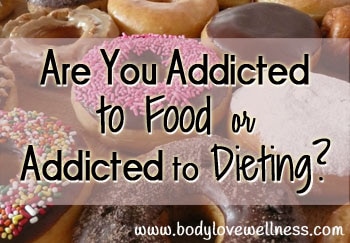 Every week, I hear from people who feel like they’re addicted to food.
Every week, I hear from people who feel like they’re addicted to food.
When you feel like you’re addicted to food, you can’t stop thinking about what you’re going to eat, what you just ate, what you might eat later. You rarely crave the nutrient dense stuff, but rather find yourself thinking about desserts or fast food or just highly processed comfort foods.
You feel anxious, overwhelmed, and desperate for the food you feel addicted to.
When I chat with these folks, every single one of them is on a diet, trying to be on a diet, or, rarely, just decided to stop dieting.
(Seriously, if you know of a “food addict” who’s never dieted, let me know!)
So why might this be? Might there be a connection between dieting and food addiction?
And moreover, might we be dealing with diet addiction instead?
The Real Deal On Food Addiction
So let’s think about addiction to food from a different perspective. What if food addiction is the symptom, and not the problem itself?
Let’s think about what it’s like to be a dieter for a moment. What do you focus on when you’re a dieter? Generally, when you’re on a diet, you’re really focused on food — how much or how little you should eat, what you should or shouldn’t eat, how many calories/points/fat grams etc. are in the food, how the food you eat is affecting your weight. This is just the tip of the iceberg in terms of the things that you might be thinking about all day long.
Just as an example, think about one of your favorite foods that you might not have been able to eat when you dieted. Rate your current craving for that food on a scale of 1 to 10.
Now, repeat to yourself twenty times, “I cannot eat [fill in the blank with that food].” Try to make that thought of “I cannot eat ____” as real as possible for yourself.
Okay, great. Now, take a moment to check in again with how much you’re craving that food on a scale from 1 to 10.
It’s likely that your craving for that food has increased dramatically right now!
This little exercise is an example of what goes on in your head, all day, every day, when you diet. Even if nothing is strictly forbidden on your diet, usually there is enough calorie control or other types of control that would make it impossible for you to eat certain calorie dense foods all the time.
Your reaction to that might be, “It’s good that I can’t eat “bad” stuff all the time! That’s why I’m on a diet.”
But what we’re illustrating here is that when you diet, you actually make it worse for yourself. You make certain foods ultra-desirable and ultra-forbidden, which is painful and can make you feel addicted to “bad” food.
A recent study with rats found that rats who were fed standard rat chow five days a week and high-sugar, chocolaty rat chow two days a week (meant to parallel the restrict/binge cycle of dieters) resulted in some interesting behavior and biochemical responses from the rats. These rats began to only desire the high-sugar stuff, and exhibited a level of anxiety and disinterest in the standard stuff. It appeared that the restriction/diet phase increased their anxiety and led them to overindulge in the “forbidden” food.
Is Dieting The Real Addiction?
Let’s take a look at some of the general symptoms of substance abuse addiction and see if they work in a dieting context. These symptoms are tolerance, withdrawal symptoms, focusing activities around the addiction, difficulty limiting the behavior, and preoccupation with the addiction.
1) Tolerance — Generally, as time passes, someone who is addicted to a substance needs more and more of it. Similarly, dieters often become more and more restrictive as time goes on. This makes sense because as weight loss slows down, the high one gets from weight loss and getting approval for weight loss starts to diminish, so the dieter has to become more restrictive and “good” on their diets to get the high.
2) Withdrawal Symptoms — When dieters go off their diets momentarily, they often feel really bad. They have tremendous anxiety about what they should eat and what they have eaten. They often eat their forbidden foods, which makes them feel bad, sometimes physically but often mentally. They beat themselves up for eating “bad” food, feel like they’ve sinned, etc. Because going off the diet can feel so terrible, they have a strong desire to return to dieting and feel “good” again.
3) Activities Become Focused Around The Addiction — Like other addicts, dieters avoid situations where they won’t be able to “use.” Similarly, dieters might avoid parties where the food will be too tempting, and they’re often unable to modify their plans when they fall outside of their rigid food and exercise regimens.
4) Difficulty Limiting Or Controlling The Behavior — I often work with clients who are completely and totally sick of dieting. They’ve read all about Health At Every Size, they know that diets don’t work, and yet, they find the idea of going back to Weight Watchers or trying a new diet overwhelmingly appealing, especially when they’re having a difficult time. This makes sense, since diets hold so much promise, and the high of approval that folks receive from weight loss is so strong. It takes guts and work to remind yourself that dieting is not the answer, even when something within you (and so many outside of you) are telling you that it is.
5) Preoccupation With The Addiction — I won’t belabor this point, but if you’ve ever been a dieter or even hung out with one, you know how preoccupied they are with their diets. They focus on and talk about what they can and can’t eat, what they ate, what they’re going to eat, and so on.
What To Do If You’re Addicted To Dieting
If you’re ready to be done with dieting, it’s important to get support from someone who’s not going to recommend another diet (or a lifestyle plan disguised as a diet) and you are really in the right place. I recommend checking out my Stop Dieting 101 resources, and if you want more support, you might like this home study program or private coaching with me. But the key is to recognize that food is not the problem and another diet is not the answer.
Do you think dieting is addictive? Let me know you’re thoughts in the comments section below!
Golda is a certified holistic health counselor and founder of Body Love Wellness, a program designed for plus-sized women who are fed up with dieting and want support to stop obsessing about food and weight. To learn more about Golda and her work, click here.
(Listen to this post here, or subscribe on itunes.)

i recall in high school noticing that weight loss program magazines had so many ads for food and articles about eating it’s as they were trying to get dieters obsessed w food…so that they wld always have a source of profits for their so-called “weight loss business”–it really was a business!!
“Food addiction is diet addiction in disguise.” — @bodylovewellnes http://t.co/nPUdKEHEAS
Are You Addicted To Food Or Addicted To Dieting? http://t.co/pJIC5gpnJn via @@bodylovewellnes
This is a wake-up call!! Are You Addicted To Food Or Addicted To Dieting? http://t.co/Iv5Af8TjHs @bodylovewellnes
Hmm… nope… I don’t diet, and never have, but I am certainly addicted to food. I think it’s important to make, and recognize, that distinction. Not all of us are dieters :)
Thanks for the share. I’m glad you dig it! RT @curvyyoga: Love this analysis from @bodylovewellnes: http://t.co/g3GN1V90qH
I was most addicted to food when I was dieting. Deprivation does not work! It creates food obsession, which leads to binge eating. There have been psych studies about this. Yet still the insanity goes on.
Are you addicted to food or dieting? Love this analysis from @BodyLoveWellnes: http://t.co/UQ6oZPh5Py
“Food addiction is diet addiction in disguise.” — @bodylovewellnes http://t.co/BvcMReUfHQ
Are You Addicted To Food Or Addicted To Dieting? http://t.co/n9pd6IIgSH